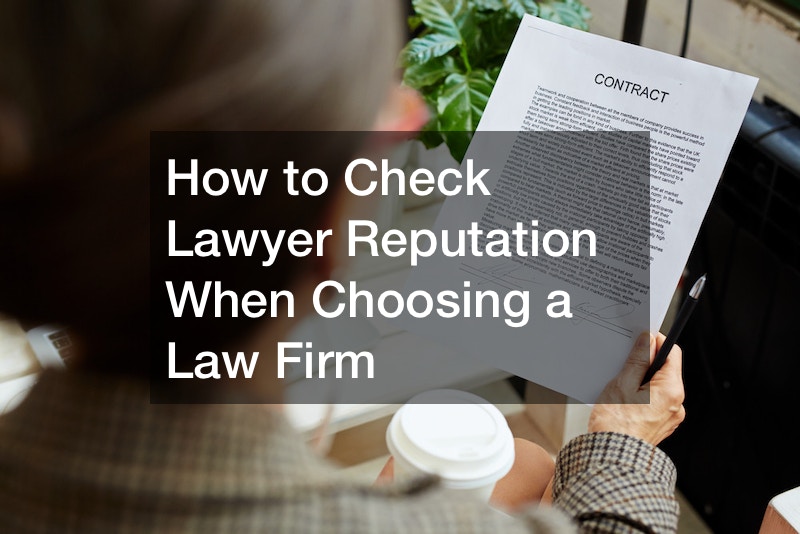How to Check Lawyer Reputation When Choosing a Law Firm
Selecting the right law firm is a critical decision that can significantly impact the outcome of legal matters. Understanding how to check lawyer reputation is a pivotal skill in evaluating their competence and suitability for your legal needs. A strong reputation not only reflects the expertise and professionalism of the lawyers but also provides insight into their ability to navigate complex legal issues. Here are ten effective strategies to thoroughly assess a lawyer’s reputation, assuring a well-informed and confident decision-making process.

Assess Online Reviews and Testimonials
To effectively gauge a lawyer’s reputation when selecting a law firm, begin by assessing online reviews and testimonials. Delve into feedback from past clients to glean insights into your potential lawyer’s capabilities. These reviews often shed light on their performance and how they handle cases, which is particularly valuable when seeking DUI lawyers. Look for recurring themes in feedback – positive comments about professionalism, communication, and success can provide valuable indicators of reputation, while consistent negative feedback may raise red flags.
Websites like Avvo, Google My Business, and Yelp commonly host client reviews that can be instrumental in your evaluation. As you embark on this journey to understand how to check lawyer reputation, remember that individual reviews are subjective, so focus on identifying consistent trends. This process allows you to make an informed decision about a law firm based on real client experiences, and in the case of DUI matters, ensures you’re selecting a lawyer with a solid reputation in handling such cases.
Verify Credentials and Bar Association Membership
As you navigate the process of selecting a law firm, knowing how to check lawyer reputation is pivotal, particularly when considering the expertise of an intellectual property lawyer. Verifying credentials and Bar Association membership stands as a crucial task in this journey. It’s imperative to confirm that the lawyer possesses the necessary qualifications and licenses to handle your legal matters effectively.
Membership in respected Bar Associations serves as an indicator of a lawyer’s commitment to their profession and adherence to ethical standards. Check the lawyer’s affiliation with these associations to gain insights into their dedication to staying updated with legal developments. This step not only enhances your understanding of how to check lawyer reputation but also assures you of their authorized practice.
In the case of intellectual property matters, this verification is especially vital, as it ensures that the lawyer possesses the relevant expertise and qualifications in this intricate field. Research your state’s Bar Association to confirm the lawyer’s good standing and inquire about any potential disciplinary actions. This verification process provides transparency about the lawyer’s conduct and history, further assisting you in your endeavor to evaluate their reputation.
Evaluate Case Success and Experience
When selecting a law firm, understanding how to assess a lawyer’s reputation is crucial, making the evaluation of case success and experience a vital component of your decision-making process. The track record of a lawyer speaks volumes about their competence and ability to handle your legal needs effectively. It provides insight into their capability to navigate complex legal scenarios, making this assessment an essential step in ensuring the best possible representation.
As you scrutinize a lawyer’s case success and experience, focus on specific aspects. Seek out instances where they have dealt with cases similar to yours, particularly if you’re seeking divorce legal advice. A lawyer with a proven history of success in divorce cases is more likely to provide you with valuable insights and strategies tailored to your situation. Look for signs of strong negotiation skills, trial experience, and a consistent track record of favorable outcomes in their practice.
Get precise results by reviewing their website for case results, exploring legal directories for their achievements, and even directly asking them for case examples that mirror your own situation. Inquiring about their approach to handling cases, their strategies, and how they plan to advocate for your interests will give you a clearer picture of their abilities. All these methods will equip you to evaluate case success and experience as part of your process of learning how to check lawyer reputation effectively.

Seek Referrals from Trusted Sources
Seeking referrals from trusted sources is an invaluable strategy to ensure you’re making an informed decision. Recommendations from friends, family members, colleagues, or professionals in the legal field can provide firsthand insights into a lawyer’s credibility and competence. This is how to check lawyer reputation when you’re in the process of selecting a law firm, especially when seeking personal injury lawyers.
Trusted sources who have had direct experience with lawyers can shed light on their professionalism, communication skills, and ability to handle cases effectively. These referrals often come with detailed accounts of how the lawyer managed their cases, giving you a realistic perspective. Additionally, online legal communities, forums, and social media platforms can be helpful in seeking recommendations and opinions on personal injury lawyers.
When seeking referrals, consider the credibility of the source. Recommendations from individuals who have gone through similar legal situations hold more weight. It’s advisable to ask about the overall experience, the outcome of the case, and any interactions with the lawyer or their firm.
Investigate Disciplinary History
In your quest to learn how to check lawyer reputation while selecting a law firm, investigating a lawyer’s disciplinary history proves invaluable. This step serves as a safeguard, ensuring your choice aligns with ethical and professional standards. By uncovering any past disciplinary actions, you gain insight into potential red flags that might influence your decision.
Disciplinary history can vary in severity, ranging from minor infractions to more serious violations of professional ethics. Common types of disciplinary actions may include reprimands, suspensions, or even disbarment. Understanding these distinctions provides a clearer perspective on a lawyer’s conduct and reputation.
To investigate, begin by contacting your state’s Bar Association. They maintain records of disciplinary actions taken against lawyers. For instance, if you’re considering a family attorney, inquire about their history with the Bar Association to ensure a reliable reputation. Additionally, online databases and legal directories can offer valuable information.
Researching the disciplinary history, as part of checking lawyer reputation, empowers you to make informed decisions. When considering a family attorney, for instance, scrutinizing their history ensures a lawyer who aligns with your values and expectations. Through this approach, you prioritize the reputation and professionalism of your chosen law firm.
Compare Fee Structures and Transparency
Evaluating how lawyers present their fees and expenses provides critical insights into their professionalism and commitment to clear communication. Different lawyers might offer hourly rates, flat fees, or contingency arrangements based on the nature of your case. This comparison lets you gauge a lawyer’s flexibility and willingness to tailor their approach to your specific needs.
Transparency in fee disclosure is equally vital. Reputable lawyers will readily provide information about their fees, any potential additional costs, and their billing procedures. When exploring their website or during initial consultations, seek clarity on how fees are determined, what they include, and how billing is managed.
Ultimately, comparing fee structures and assessing transparency extends beyond monetary considerations. It reflects a lawyer’s commitment to ethical practices and establishing trust. Ensure that your chosen law firm not only possesses legal prowess but also places value on openness and honesty in their professional dealings with you.

Interview Past Clients for Insights
Curious about how to check lawyer reputation when selecting a law firm? Ever thought about interviewing past clients for insightful perspectives? If will attorneys are on your radar, you might be wondering how to find these previous clients to gather their opinions. Well, start by directly asking the lawyer for references or tap into online reviews and forums for potential leads.
Now, armed with the contacts of former clients, what questions should you ask? Seeking information about communication effectiveness, the handling of legal matters, and the lawyer’s approach to cases can be enlightening. Don’t forget to inquire about professionalism, responsiveness, and whether the desired outcomes were achieved. These questions serve as your compass in navigating how to check lawyer reputation.
Maintaining professionalism throughout this process is essential. While it’s natural to seek both positive and negative experiences, remember to approach the interviews with a neutral tone. Stick to factual inquiries, avoiding any disparaging comments. By following this approach, you’ll establish an atmosphere that encourages candid feedback, ultimately assisting you in effectively understanding how to check lawyer reputation and guiding your decision-making journey.
Review Published Work and Lectures
When it comes to learning lawyer’s reputation while choosing a law firm, one effective approach is to review the published work and lectures of the lawyers you’re considering. These are public manifestations of their legal expertise, providing insights into their knowledge, perspectives, and overall reputation within the legal community. The insights gained from reviewing published materials can significantly inform your decision about a criminal lawyer, for example.
As you engage with their published content and lectures, focus on specific elements that illuminate their reputation. Seek out materials that relate to your legal needs, ensuring their expertise aligns with your requirements. Look for clear, well-researched, and insightful content that showcases their competence and professionalism. Consistency in delivering valuable legal insights can indicate a solid reputation.
In terms of costs associated with accessing these materials, it can vary. Some published work might be freely available online, while others could require purchasing books, journals, or subscribing to legal publications. Attending lectures or seminars might involve fees that range from $50 to $300 per session. Despite these potential expenses, viewing them as investments in understanding how to check lawyer reputation can prove invaluable.
Analyze Peer Recognition and Awards
Before hiring a law firm, delving into peer recognition and awards serves as a valuable strategy. This aspect sheds light on a lawyer’s standing within the legal community and their notable achievements. Analyzing this recognition can provide valuable insights into their competence and reputation.
Peer recognition and awards encompass various types, each showcasing different facets of a lawyer’s expertise. Particularly, if you’re considering eviction lawyers, focus on awards that align with your legal needs. Awards like ‘Top Eviction Lawyer’ or recognition from relevant legal associations can attest to a lawyer’s specialization and proficiency in handling eviction cases.
Verifying the legitimacy of awards is essential. Some organizations might offer awards with minimal evaluation criteria. To ensure credibility, seek awards from established legal associations or those with rigorous selection processes. Websites of respected legal organizations can help you cross-reference and verify awards.

Examine Pro Bono and Community Involvement
As you explore how to check lawyer reputation while selecting a law firm, delving into their pro bono and community involvement offers profound insights. Pro bono work involves providing legal services without charge, aiming to aid those who can’t afford representation. Lawyers often engage in pro bono efforts to contribute positively to society, ensuring access to justice isn’t limited by financial constraints.
To uncover a lawyer or law firm’s pro bono and community contributions, start with their website. A seasoned criminal law firm, for instance, highlights its pro bono cases and community partnerships. You can also consult local bar associations, legal directories, and news articles for additional information about their philanthropic endeavors.
Participating in pro bono work signifies more than just charitable efforts. It reflects a lawyer’s unwavering commitment to their ethics and values, illuminating their dedication to justice beyond financial gain. Such engagement showcases their genuine concern for the well-being of others and indicates a strong reputation in the legal community. This practice isn’t limited to specific areas; even will lawyers can demonstrate their principles through pro bono contributions.
In the intricate world of legal representation, the saying ‘actions speak louder than words’ resonates profoundly. As you embark on the journey of choosing a law firm, remember that a lawyer’s reputation isn’t solely defined by their marketing efforts, but rather by their deeds and contributions. The strategies outlined in this guide equip you with the tools to sift through the noise and discern the essence of a lawyer’s standing in the legal community. Happy checking!






